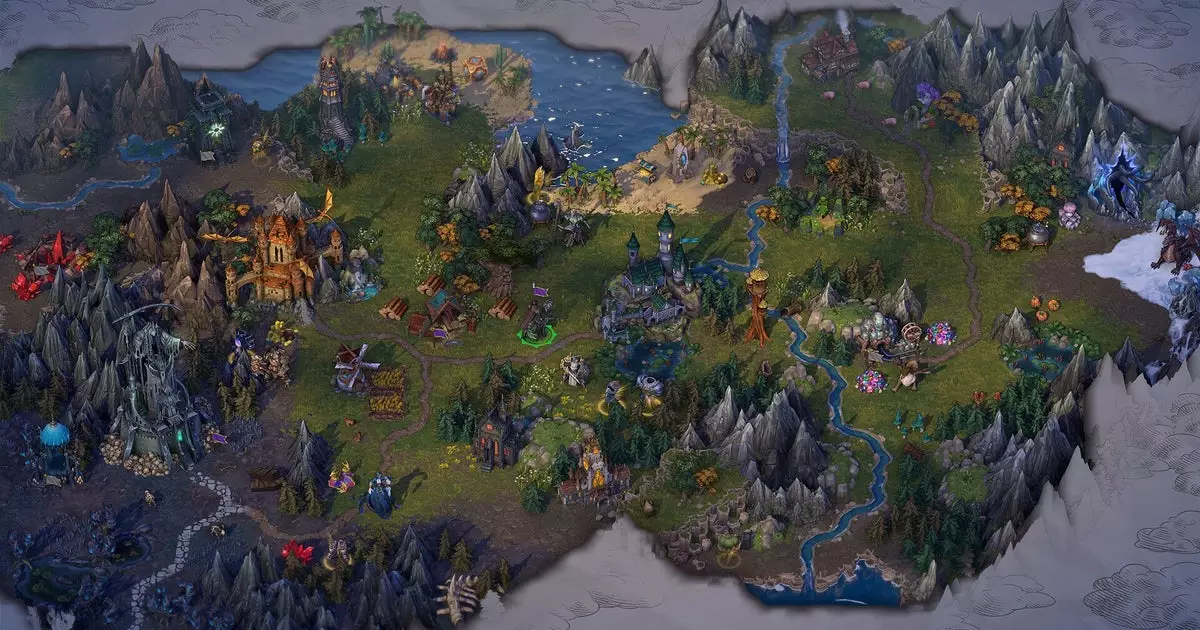The gaming industry is in a perpetual state of flux, constantly reshaping how franchises are managed, marketed, and monetized. Ubisoft’s decision to entrust the publishing duties of its upcoming title, *Heroes of Might and Magic: Olden Era*, to Hooded Horse is a revealing example of this ongoing transformation. While at face value, this move may seem like a simple logistical decision, a deeper analysis uncovers a narrative of strategic recalibration, economic pragmatism, and shifting priorities within the industry’s giants.
Historically, Ubisoft has served as the primary steward of its legendary franchises, taking on both development and publishing responsibilities. Handing off this mantle suggests an evolving approach—one that favors partnering external publishers with niche expertise rather than maintaining tight control over legacy IPs. This may also reflect internal struggles—perhaps a recognition that, despite its vast resources, Ubisoft’s internal teams are being prioritized for newer, more profitable projects, leaving older franchises like *Heroes of Might and Magic* to the margins.
The Role of Hooded Horse: Niche Expertise and Strategic Partnerships
Hooded Horse, known for its focus on strategy titles such as *Manor Lords* and *Norland*, brings to the table a specialized portfolio that aligns well with the needs of a franchise like *Heroes of Might and Magic*. Their track record indicates a commitment to deep, tactical gameplay, and community engagement—traits that resonate deeply within the core strategy audience. Entrusting their capabilities to this publisher signals Ubisoft’s recognition that niche expertise can sometimes outshine the efforts of large, decentralized corporate structures in reaching dedicated fans.
Moreover, Hooded Horse’s rising influence in the global strategy scene positions them as an ideal bridge between development studios and the targeted audience. They are not just a publisher; they are a strategic partner attuned to the nuances of niche markets. This specific collaboration indicates a broader industry trend: Big publishers rely on smaller, agile partners to keep legacy franchises alive without investing heavily in their own marketing and distribution infrastructure.
Underlying Motivations: Cost-Cutting, Market Focus, and Strategic Realignment
Behind this seemingly straightforward arrangement lies a complex web of economic considerations. Ubisoft’s recent financial activities—splitting into separate entities, experiencing delays, and signaling cost-cuts—are telling signs of a company navigating turbulence. Dividing their portfolio and offloading certain titles could be an effort to streamline operations and optimize profit margins amid fluctuating market conditions.
The decision to bring in Hooded Horse might be motivated by a desire to reduce overhead costs related to publishing efforts. Smaller publishers often operate with lower expenses, allowing Ubisoft to safeguard the franchise’s integrity without diverting extensive resources. Additionally, Ubisoft’s strategic focus appears to be skewed toward blockbuster franchises like *Assassin’s Creed*, *Rainbow Six*, and *Far Cry*, which require colossal marketing budgets and global campaigns. Classics with more niche followings—such as *Heroes of Might and Magic*—are perhaps better suited to specialized publishers that understand and can cultivate dedicated fan bases.
Implications for Franchise Revival and Industry Dynamics
By partnering with Hooded Horse, Ubisoft is effectively hedging its bets—allowing an experienced, passionate publisher to breathe new life into a beloved franchise while minimizing its own financial exposure. It raises questions about the future of legacy IP management. Does this signal a broader industry move toward decentralization, where legacy titles are treated more as specialist projects than core revenue drivers? Or is it a temporary measure in response to economic pressures?
From a consumer standpoint, this move could bring positive changes. Smaller publishers often innovate more rapidly, engage more directly with fans, and explore creative directions that large corporations might shy away from. However, it also raises concerns about the perceived quality and consistency of the franchise’s new iteration. Fans of *Heroes of Might and Magic* might hope for reverence to the original’s tactical depth, but at the same time, risks of compromise loom as corporate priorities shift.
In the end, Ubisoft’s decision signals a nuanced balancing act—preserving its cherished IPs while adapting to the economic realities of modern AAA game publishing. The collaboration with Hooded Horse may serve as a case study in how established companies can leverage niche expertise to keep classic franchises vibrant amid market challenges, but whether this strategy sustains the franchise’s legacy remains to be seen.

